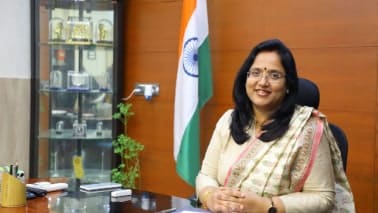How to Become DM (District Magistrate) in India
17 min read
How to become DM is a big question mark to many of them? Most preferably for those who are very passionate and have already decided on their aim in life. District Magistrate which is abbreviated as Dm is one of the positions that an IAS Officer acquires.
But with this passion and ambition, there is one more thing that is very important to become a Dm. If you have to find that one quality you must read the article till the end. This article will guide you and help you to become a DM that also in simple steps.
A District Magistrate is ahead of a particular district. With a good salary and reputation, a District Magistrate also gets a lot of benefits along with basic pay. All the benefits of Dm are disclosed in the article. Keep reading the article so that you come across the salary with allowances.
To become Dm you must crack all the rounds of the UPSC exam. UPSC exam comprises 3 stages namely – Prelims, Mains, and Interview. Keep reading the articles until the end as I will be sharing a lot of information with tips to become Dm. So, let’s get started.
Who is DM
Many people are not aware of what actually Dm is? Are you also the one? Then, let’s first understand in detail what Dm is.
To tell more about, Dm is a district magistrate and Dm is none other than an IAS officer. Dm is a and administrative officer of a district. He is also known as the chief executive magistrate of the district. Dm is also known as the District Collector. A Dm is responsible for the administration of the whole district.
Presently, India consists of 718 districts and each of the districts in our country is run smoothly by a District Magistrate. To assist a DM there are many officers like SDO, SDM, BDO available who assist the DM.
To become a DM the candidate must first qualify for the UPSC-CSE exam and become an IAS officer. After serving as an IAS officer for 6 years, including 2 years of the training period, a candidate is eligible to become a DM. To become a DM the candidate has to be at the top of the rank list of IAS Officers.
Dm is just such a Protocol Officer of the district? Dm is none other than an Indian Administrative Service Officer who is also a Chief Executive of a district. And, is in charge of the role and responsibility of the administration of the whole district.
DM Full Form
The full form of Dm is District Magistrate. Dm is the chief administrative officer of a district who is also responsible for the revenue of a district.
How to Become DM
For Becoming a DM, firstly you have to pass the Union Public Service Commission (UPSC) exam and secure a rank within the top 100. Once you clear this exam you will become an India Administrative Services Officer (IAS). IAS Officer, after one or two promotions you will become a District Magistrate (DM).

Now, it is crystal clear that to become a DM you have to become an IAS officer first. To become an IAS Officer you must qualify for Civil Service Exam (CSE) conducted by Union Public Service Commission. To apply for the UPSC exam you must be eligible for some criteria. Do you want to know the eligibility criteria to become DM and apply for UPSC then read it below?
Eligibility Criteria
To become Dm you need to have some requirements. The eligibility criteria are – Nationality, Educational Qualification, Age Limit. Lets us now see the details of each requirement below.
Nationality
The candidate applying for the UPSC exam and who aspires to become a DM should be a Citizen of India.
Age limit
The minimum and maximum age limits to become a DM are explained in detail below.
Minimum Age Limit
The minimum age limit to become DM is 21 years.
The age limit to become DM as per the category with the number of attempts is listed below.
| Category | Age | Relaxation | Attempts |
| General | 21-32 | N.A | 6 |
| OBC | 21-35 | 3 years | 9 |
| SC/ST | 21-37 | 5 years | No limit |
- To tell more in details the age limit for the candidate of the General Category between the age of 21-32 years is eligible to become DM.
- But, if you belong to the OBC category then age should be between 21-33 years, and there is 3 years of age relaxation.
- For SC/ST category then your age should be between 21-35, which is 5 years of age relaxation.
Maximum Age Limit
The maximum age limit as of 1st August 2020-
| Category | Age Limit |
| General Category | 32 Years |
| OBC | 35 Years |
| SC/ST | 37 Years |
| Defense Service Personnel | 35 Years |
| Ex-Servicemen | 37 Years |
| Handicapped Person | 42 Years |
| ECO’s/SSCO’s who have been in Military Service for 5 years |
37 Years |
Age Limit For Handicapped
For handicapped and disabled candidates the age limit and the maximum number of attempts for the exam are as follows.
| Category | Age | Attempts |
| General | 42 | 9 |
| OBC | 45 | 9 |
| SC/ST | 47 | No Limit |
Number of Attempts
The number of attempts as per the category to become a DM is listed below.
| Category | Number of Attempts |
| General Category | 6 Attempts |
| OBC | 9 Attempts |
| SC/ST | No limit till 37 years |
| General Category (Handicapped) |
9 Attempts |
| OBC (Handicapped) |
9 Attempts |
| SC/ST (Handicapped) |
No Limit |
Educational Qualification
To become a Dm you need to have a bachelor’s degree in any field from any recognized University. Then, the candidate is eligible to fill the form of UPSC and prepare for the examination.
Points to be Noted
- The graduation degree can be in any of the fields of his choice.
- Even those candidates who have completed their education from distance education or through correspondence education are eligible to apply for a post of a Dm.
- Candidates can apply for the examination even in the final year of graduation.
- Candidates awaiting the results are also eligible for the Prelims Exam of the UPSC-CSE Exam. But for Mains Exam they have to produce proof of passing the exam.
- Candidates with technical degrees are also eligible to apply for this post.
- Also, a candidate with a professional qualification can apply for the exam.
- A Medical student who has completed the degree but is undergoing an internship program is also eligible to apply for the post.
- Candidates who have passed the ICAI, CWA, or ICSI Exam.
How to fill IAS Exam Form
If you want to apply for the UPSC exam and fill the IAS form then you just need to follow the simple steps given below.
Step 1: Go to the Official website of UPSC is www.upsc.gov.in
Step 2: Click on Online Application for Various Examinations.
Step 3: The next step is to click on Service and then go to Civil Services Exam – Preliminary Exam.
Step 4: Start registering now with IAS Part 1.
Step 5: Fill the form with all your personal details.
Step 6: The fee for this particular form is Rs. 100/-
Step 7: You can choose the exam center at your convenience.
Step 8: Be particular with your passport size photo, signature & identity card.
Step 9: Accept the Declaration by clicking on it.
Step 10: After rechecking the details click on the Submit button.
Step 11: Keep the printout with you.
What is UPSC
As I mentioned above to become a DM you have to crack the UPSC exam and become an IAS officer. To apply for the UPSC exam you must acquire the details of the exam. Let us first have a quick overview of the exam and then understand what is UPSC exam, stages of the UPSC?
UPSC Exam Overview
| Exam | UPSC -CSE Exam |
| Authorized Body | Union Public Service Commission |
| Level | National |
| Exam Stages | 1. Preliminary 2. Mains 3. Interview |
| Eligibility Criteria | Nationality – Indian Age Limit – Between 21 to 32 years ( General Category) Age limit for OBC – 35 Years Age limit for ST/ST – 37 Years Educational Qualification – The candidate must have completed graduation in any field. |
| Number of Attempts | 6 Attempts (General Category) For OBC – 9 ST/SC – No limit |
To become Dm you need to crack the UPSC’s Civil Service Exam (CSE). UPSC is a National Level Exam. UPSC stands for Union Service Public Commission which is a central agency that conducts IAS Exam (Indian Administrative Service).
UPSC is also known as Civil Services Examination which is conducted by UPSC. Also, it is a pen-paper type. The total number of attempts a person is liable to give are attempts of 6 attempts. UPSC is an All India Exam to become DM, IFS, IAS, IPS, SDM & Collector.
The total number of vacancies after qualifying for this exam is approximately 800 and above. More than 8 lakhs candidates apply for this National Examination every year.
Online Application for the exam starts from February to March tentatively. Generally, UPSC conducts an exam once a year generally in the month of October. The result of the exam is declared in the month of November.
The process for the IAS exam conducted by UPSC is as follows.
- Preliminary exam
- Mains exam
- Interview process
1. Preliminary exam
- The preliminary exam has 2 papers that are conducted.
- Each paper has 200 marks.
- The question paper is in two languages namely English and Hindi
- The duration of the paper is 2 hours.
- This examination carries a negative marking of the one-third penalty. That is for each wrong answer there is a negative marking of 0.33 marks
- The preliminary Exam generally takes place in the month of October.
The Preliminary exam consists of two papers – Paper 1 & Paper 2. The details of both papers are listed below.
Preliminary Exam Details
| Paper | Type | Number of Questions |
Marks | Negative Marking |
Duration |
| Paper 1 | Objective | 100 | 200 | 0.33 | 2 hours |
| Paper 2 | Objective | 80 | 200 | 0.33 | 2 hours |
Syllabus for the Preliminary Exam
Paper 1. Current affairs
Here, you need to have very good general knowledge and good general studies of current events going on at the National and international levels. You need to read newspapers to gain general knowledge.
Paper 2. Civil Service Aptitude Test (CSAT)
This paper comprises competencies related to comprehension, interpersonal, and communication skills. Hereby analytical ability, logical reasoning, and mental ability are also tested. Also, there are questions related to decision-making and problem-solving.
The syllabus for both the papers of the Preliminary exam is listed below.
| Paper 1 | Indian History General Science Indian Politics Current Events General Issues Indian Geography World Geography Social Development Economic Development |
| Paper 2 | Communicational Skills Intrapersonal Skills English Skills English Comprehension Language skill that is chosen by the candidate Decision-making skills Problem-solving ability Mental Ability Basic Numeracy |
2. Mains exam
- After qualifying for the preliminary exam the candidates are eligible for the second round that is the mains exam.
- Generally, Mains Exams are conducted in the month of January.
- After the mains exam, the candidate will be liable for the process of the interview.
- Though the Mains exam consists of 9 papers, out of these 9 papers, only 7 papers will be taken for the merit ranking. For the remaining two papers the candidate should obtain the minimum marks as set by UPSC. The total marks for this examination are 1750 marks.
The Mains exam includes a total of 9 papers that are listed below. More details are given below.
Mains Exam Details
| Paper | Syllabus | Marks | Duration |
| Essay | Essay on any topic | 250 | 3 hours |
| General studies 1 | Indian Heritage, Culture, Geography |
250 | 3 hours |
| General studies 2 | Constitution, Governance, Social Justice |
250 | 3 hours |
| General studies 3 | Technology, Environment, Disaster Management |
250 | 3 hours |
| General studies 4 | Ethics, Integrity, and Aptitude |
250 | 3 hours |
| Optional subject 1 | Any | 250 | 3 hours |
| Optional subject 2 | Any | 250 | 3 hours |
| Paper 1 | Indian Language (Anyone of the language) |
300 | 3 hours |
| Paper 2 | English language | 300 | 3 hours |
Syllabus for the Mains Exam
1. Essay
To write an essay on any one topic. You can choose the option of your choice from the given options.
2. General Studies 1 : Indian Heritage & Culture
- Indian Culture
- Modern Indian History
- History of the world
- Society
- Geography
- Events, Forms, and Effects on Society
3. General Studies 2: Indian Constitution & Indian Politics
- The Constitution Of India
- Amendment Procedure
- The Political System
- Central Government And Administration
- The Electoral Process
- Administrative Law
- Central And State Government Privileges
- Public Services
- Social Welfare And Social Legislation
- Control over Public Expenditure
4. General Studies 3: Science & Technology
- Energy
- Computer and Information Technology
- Biotechnology
- Disaster Management
- Nuclear Policy Of India
- Space Technology
- Environment
- Security
- Agriculture
- Economy
5. General Studies 4: Ethics & Human Interface
- Ethics and Human Interface
- Aptitude
- Attitude
- Integrity
- Emotional Intelligence
- Public Service Values And Ethics in Public Administration
- Probity in Governance
6. Optional Subjects
There are 2 Papers on Optional Subjects. The candidate is supposed to choose any 1 optional subject out of 48 total options. The 2 papers are combined and are of a total of 500 marks. You need to be very careful while choosing your optional subject. You must know which optional subject will work best for you.
The candidates can choose their Optional Paper 1 & Paper 2 from the subjects listed below.
- Law
- Physics
- Statistics
- Philosophy
- Zoology
- Sociology
- Public Administration
- Political Science
- Medical Science
- Management
- Mechanical Engineering
- Civil Engineering
- Electrical Engineering
- Economics
- History
- Geography
- Mathematics
- Geology
- Commerce
- Agriculture
- Animal Husbandry
- Chemistry
- Botany
- Anthropology
7. English & Language Papers
The pattern of both papers is almost the same in nature. The English language is a compulsory language. Whereas, other languages can be chosen from a list of languages.
The pattern of the paper is as follows.
- Essay – 100 Marks
- Comprehension – 60 Marks
- Precis Writing – 60 Marks
- Translation from English – 20 Marks
- Translation from Chosen Language – 20 Marks
- Grammar – 40 Marks
Note: The candidate is free to choose his writing language as English, Hindi, or any other language listed in the Indian Constitution.
3. Interview Process
- After cracking the Mains Exam you are qualified for the Interview Process.
- Approximately 400-450 candidates reach this round.
- When you qualify the interview round you become a Dm.
- During the review subject knowledge, personal skills, as well as Mental Ability, is tested.
- In the interview, only academics knowledge is not tested but the personality test is all about how much the candidate is alert and all aware of the events happing around.
- After cracking the final round of interviews a candidate is qualified to become an IAS officer. And, IAS Officer promotions gives Dm designation.
- He is given training and then posted according to the requirements.
Syllabus for Interview
- During the interview subject knowledge, personal skills, as well as Mental Ability, is tested.
- This is basically a question and answers session.
- This exam is of 275 marks.
- The interview is nothing but a Personality Test.
- Even current affairs and General knowledge questions can be asked for an interview.
Books & Study Material
To crack the UPSC examination and become an IAS officer you need to have acquired General Knowledge. For this, you need to keep on reading the newspaper on a daily basis also without fail.
Hindu newspaper, Jagran Josh, Economic Times, & Indian Express is something I would suggest to enhance your general knowledge and current affairs. Other lists of books that I would suggest are as follows.
- Indian Polity For Civil Service Examination -Indian Polity by Laxmikanth
- Indian Year Book
- Indian Economy by Ramesh Singh
- Oxford Geography Atlas
- A Brief History of Modern India
- Indian Art And Culture
- Fundamentals of Geography(NCERT)
- Concise History of Modern India by Sujata Menon
- Facets of Indian Culture
- The Constitution of India by P.M Bakshi
- Indian Economy by Mishra and Puri
Role & Responsibilities of DM
Dm has many functions to discharge. The role and responsibilities of Dm are as follows given below.
- To look forward to the administration of the district in a very proper way is the responsibility of a district magistrate
- Maintenance of law and order in the district
- Dm also supervisors the police and is responsible to conduct magisterial inquiries
- He/She is also responsible for collecting the land revenue of the district.
- Fulfills the role of arbitrator
- Solely responsible for the land acquisition of district
- Plays an important role in disaster management and crisis management in case of any crisis
- To look forward tax revenue maintenance of the district
- He/She also supervisors activities of magistrates
- Also, he is responsible to take all the necessary actions which can prevent crime within the district. The public safety of the district and its protection is his responsibility
- He/She is the person to submit the annual crime report to the government
- To throw more light he is also the person who also looks after all the election processes working within the boundary of a district
- He/She is the sole person responsible to implement the transfer of the government officials and also to grant the leaves to different officials within the district
- It is also DM’s responsibility to submit the annual budget of the district to the government
Also, Read
The Salary of DM in India
Usually, an IAS officer becomes DM after 8 to 10 years. The salary of DM is paid as per the new pay structure. All the IAS officers including DM are paid according to the 7th pay commission. This structure is called pay grades for civil services. The salary structure of all IAS officers has been changed after the 7th pay commission recommendation came into force.
Accordingly, the basic salary for the month of an IAS officer including a DM is Rs. 56,100. TA, DA, and HRA are not included in this amount. This basic pay goes on increasing with promotions. The Promotions & the Salary of a DM are directly related to each other. The more promotions the more is your salary hike. And, if you reach a designation of Cabinet Secretary the salary becomes 2,50,000/-.
Let us have a look at the salary distribution of a DM. The salary of a DM differs according to the years of experience and designation with promotions. If you want to read in detail about IAS Officer salary then read here – Salary Of IAS Officer in India.
District Magistrate is paid basic pay with DA, TA, and HRA. The Salary below does not include DA, TA, & HRA.
| Post | Number of years of service | State Secretariat | Central Secretariat | (Basic Pay) |
| Sub Divisional Magistrate | 1-4 | Under Secretary | Assistant Secretary | Rs.56,100 |
| Additional District Magistrate | 5-8 | Deputy Secretary | Under Secretary | Rs.67,700 |
| District Magistrate | 9-12 | Joint Secretary | Deputy Secretary | Rs.78,800 |
| District Magistrate | 13-16 | Special Secretary and Director | Director | Rs.1,18,500 |
(DA – Dearness Allowance)
(TA – Travelling Allowance)
(HRA – House Rent Allowance)
To talk about other benefits that you get which salary is the Dearness Allowance (DA). The dearness allowance for DM is revised on a half-yearly basis. DA is also affected by the inflation rate. But surely it increases every year.
District Magistrate – Perks & Benefits
To talk about other benefits that you get which salary is the dearness allowance (DA), House Rent Allowance, Medical Allowance, Traveling Allowance, Security, Bills, Vacation, and Pension.
Dearness Allowance (DA)
It is due to the DA that the salary of Dm is increased by the government after intervals. The dearness allowance for an IAS is revised on a half-yearly basis. DA is also affected by the inflation rate. But generally, it increases every year.
House Rent Allowance (HRA)
The house rent allowance difference from city to city. The housing flowers generally range from 18 to 24% of the IAS Officer’s Basic Pay.
Medical Allowance
The benefits that a Dm enjoys also comprise the medical allowance. A Dm can reimburse that medical allowance at the time of the medical treatment.
Travelling Allowance (TA)
Dm is also assigned a vehicle. Generally, in a rural area, the officer gets an ambassador car. Whereas in city areas the officers get luxury cars In Innova, Fortuner, etc.
Security
A Dm is not permitted to carry on their own by the government. But for the security of Dm officers, the government allots the bodyguards to the Dm and their families.
Bills
An Officer might get the electricity, gas, water, and phone bill for free. Sometimes it is not free then the officer may get it at a very subsidized rate.
Vacation
A Dm is allotted a guest house or a bungalow during his/her business or non-business trips.
Pension
A Dm enjoys a good hand full amount of pension a lot of retirement benefits.
Also, Read
Tips for IAS Preparation
One more thing that you need with a passion to become an IAS officer is hard work. Only aiming is not a key to success, but putting in endless efforts is the key to success. UPSC is one of the toughest exams to crack. And you really need to work hard to achieve your goal of becoming a DM. If you want to read in detail about how to crack UPSC and become IAS Officer in the first attempt then read here – Proven ways on How to crack UPSC.
1. Early Preparation
UPSC is one of the toughest competitive exams. It is not going to be an easy task to crack it. Simultaneously many candidates also apply for vacancies. So if you want to come out with flying colors in this competitive exam you should start your preparation early.
Last moment studies are not at all going to help you. Start your UPSE-CSE Exam Preparation after the 12th itself. You will get the total span of the graduation period to prepare for the examination.
2. Attention on all the subjects
Give overall attention to all the subjects. Focus more on the subject which you find difficult. Also, pay more attention to the technical subjects.
3. Solve all your doubts
Try solving all your doubts at that particular time only. Do not proceed further by keeping a doubt. Get a solution to your doubts and issues.
4. Constant Reading
If you want to crack MPSC Exam it is mandatory for you to develop a reading habit. Read more newspapers. Surely, this will enhance your General Knowledge and Current Affairs.
5. Time Management
Proper time management and scheduled time table is a perfect key solution to crack this examination. Balance time management with all the subjects and distribute the time evenly.
6. Smart Study with proper guidance
The prior most step before starting the preparation is to understand the examination pattern and syllabus. Study accordingly is a smart study.
7.Previous Year UPSC Paper Solving
After the preparation revision is a must. Yes, I do agree but with revision previous year paper solving is also a must. You will understand the paper pattern and will be used to and prepared for the examination.
UPSC Previous Year Question Paper-Click Here
UPSC Topper Interview
UPSC Topper Dr.Jitendra Agrawal’s interview questions. He ranked UPSC-128 Rank in 2019. Read his detailed information.
Difference Between District Magistrate & District Commissioner
| District Magistrate | District Commissioner |
| The main responsibility of a district magistrate is to look forward to a collection of revenues, taxes, and arrears. | The main responsibility of a District Commissioner is to coordinate the working of other departments & local bodies. |
| He/She is also involved in the collection of land dues. | He/She is not directly responsible but has to report all the details to Divisional Commissioner. |
| He/She plays a vital role in revenue administration. | He/She plays a vital role in coordination with various departments. |
How to Become DM FAQ’s
When Does IAS Become DM?
For Becoming a DM, firstly you have to pass the Union Public Service Commission (UPSC) exam and secure a rank within the top 100. Once you clear this exam you will become an India Administrative Services Officer (IAS). IAS Officer, after one or two promotions you will become a District Magistrate (DM). It approximately takes 8-10 years or more for an IAS Officer to become a DM. For this, you really need lots of patience with hard work.
Can you choose the district of your choice for DM posting?
After qualifying as an Indian Administrative Officer (IAS) officer with some experience, DM Officer is posted to the respective district by the State Government. The candidate does not as such have any choice to select the district for the posting of DM on his own. Nor the candidate is posted to his own hometown. The state government is also responsible for the transfer of the DM from one district to another. If you want to know the procedure to become an IAS officer then read here – How to become an IAS officer.
How to Become DM after 12th?
The right answer for this question is students at least need to complete their graduation to appear for the UPSC-CSE exam. So, 12th pass students cannot directly appear for the UPSC exam. But they can surely start their preparation for the UPSC exam. As UPSC is one of the competitive exams in India and you really need to work hard with dedication to crack it. Good Luck!
Conclusion
To sum up, this was all about how to become Dm. I hope the information was worth reading and all your queries got cleared with the relevant information provided in the article.
For any more queries regarding how to become a Dm, you can reply to us with a question in the comment box. We would get back to you with an answer to your query.
If you have liked the article do not forget to share it with your friends. Sharing is Caring!!!






